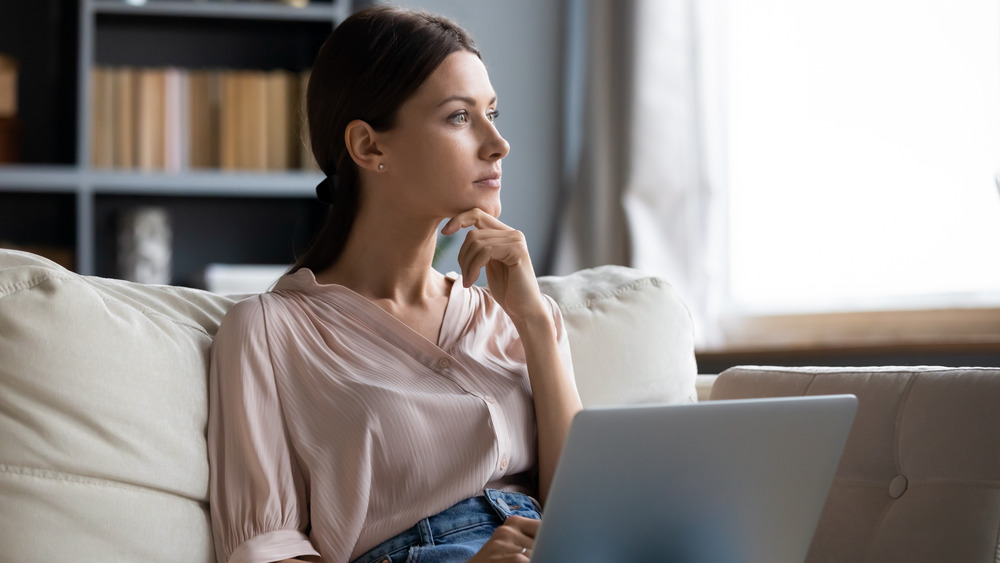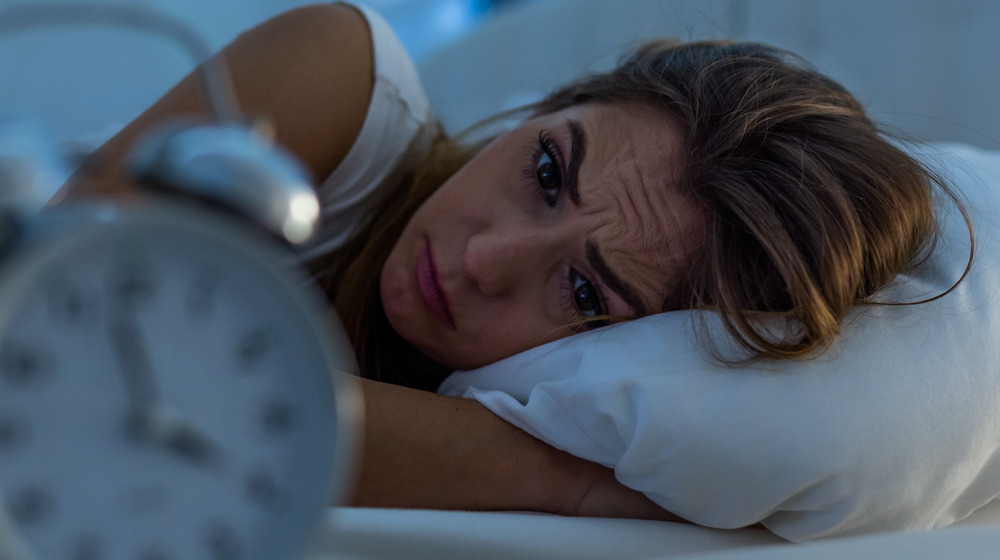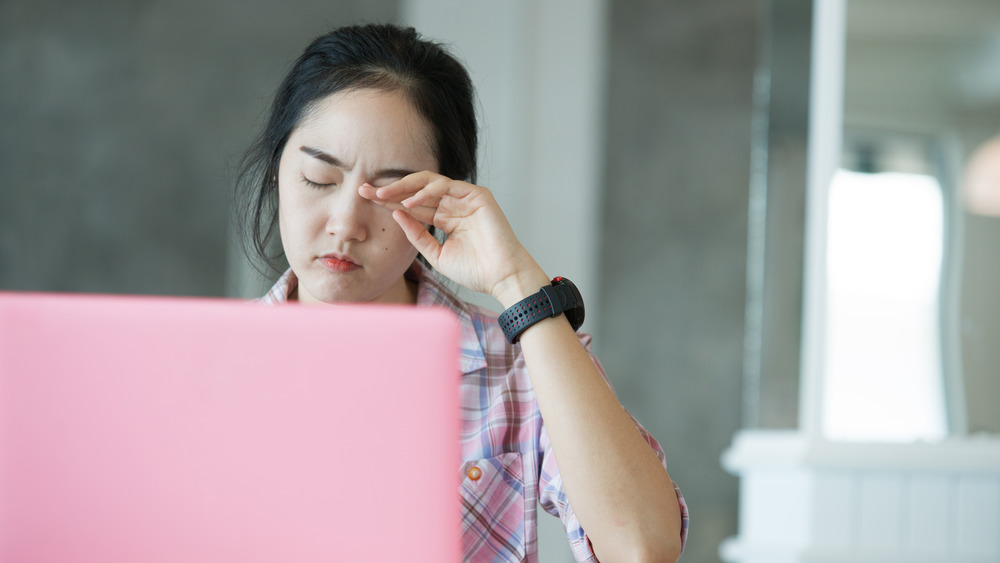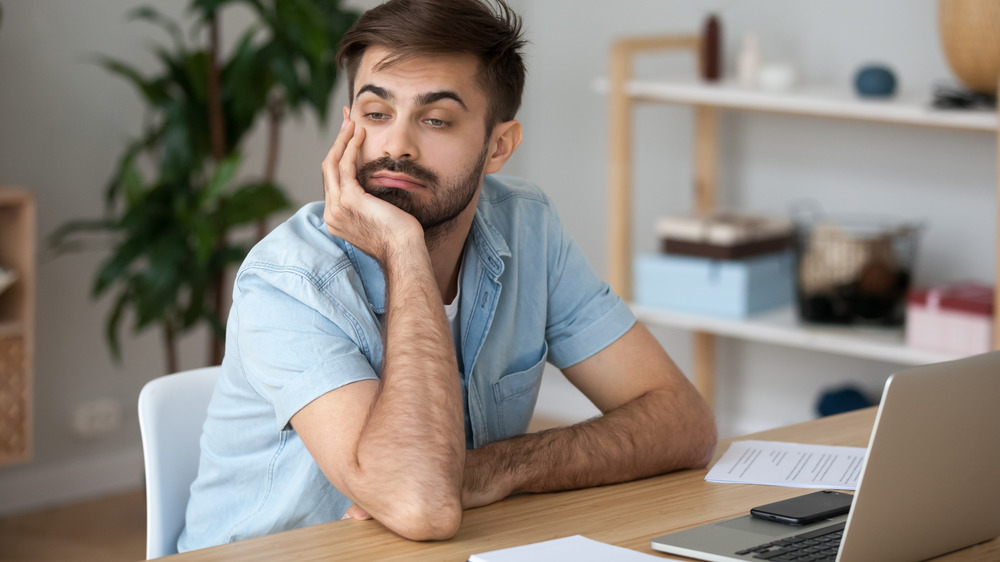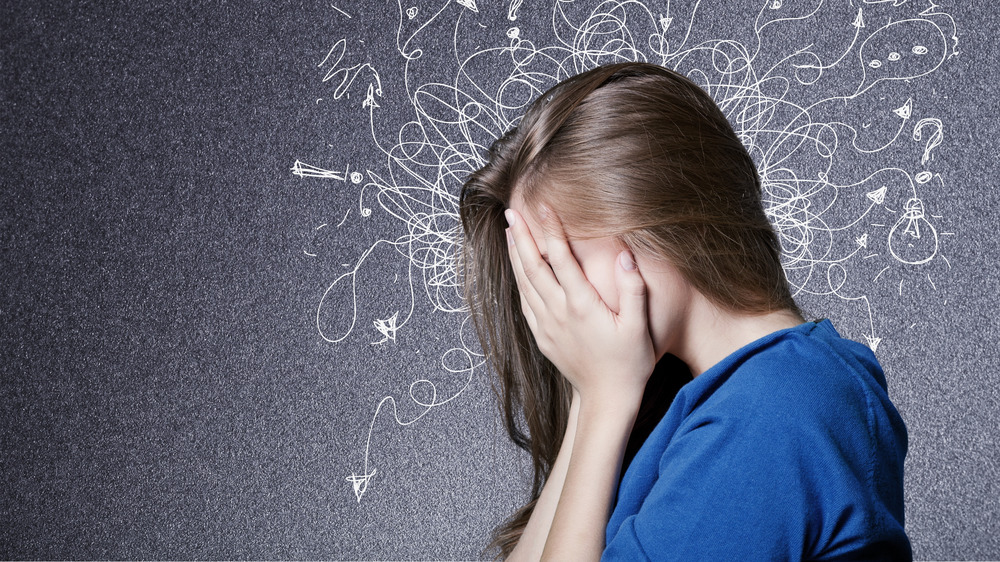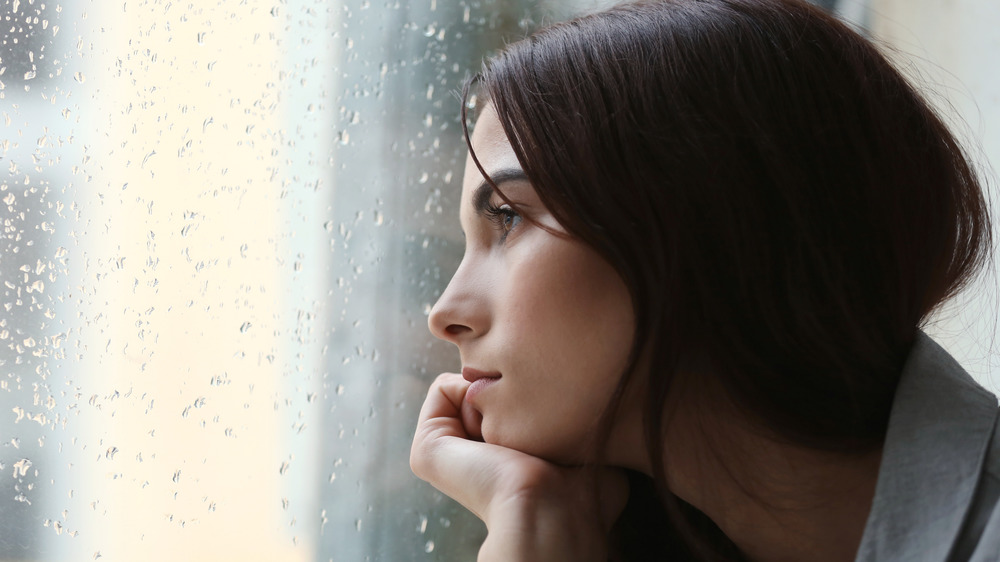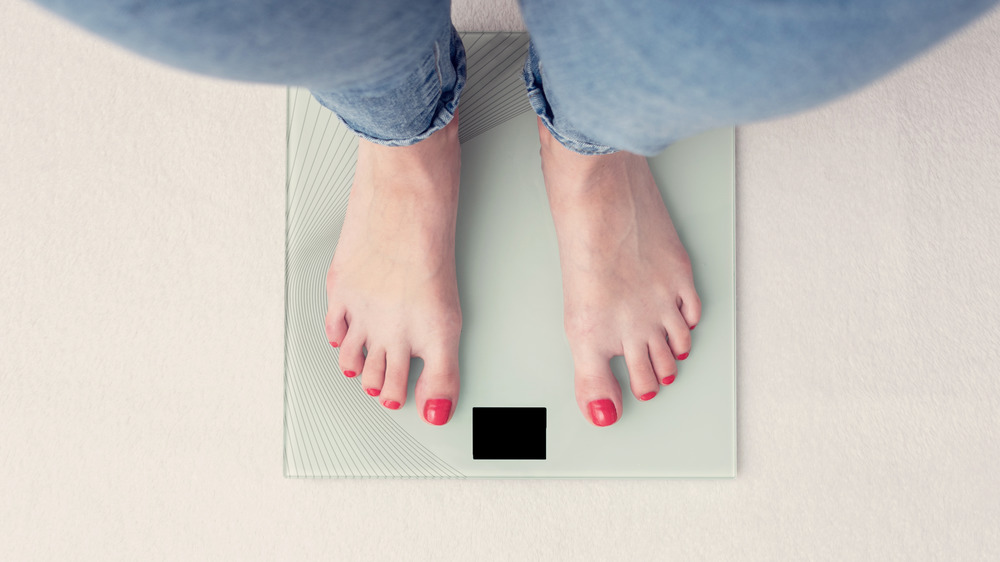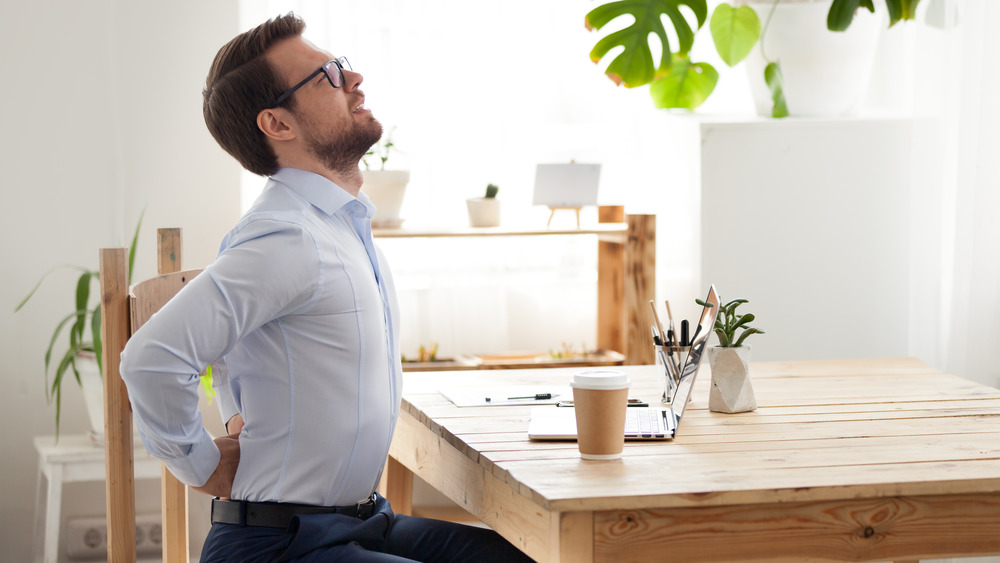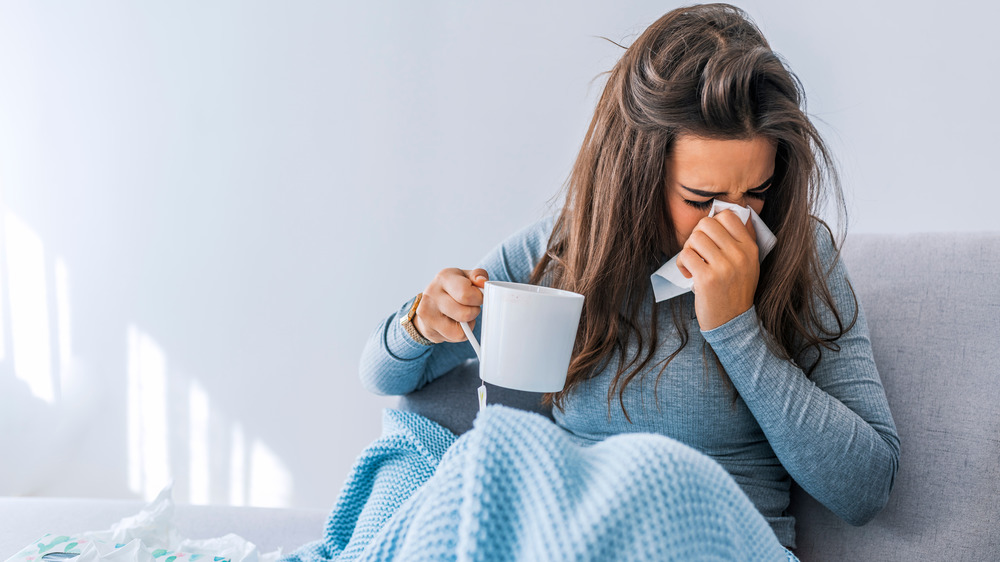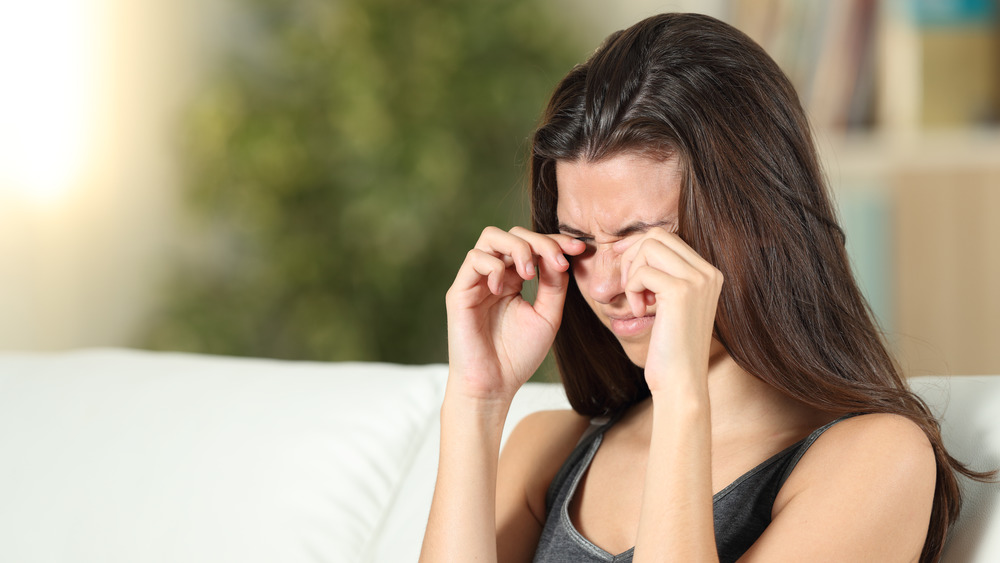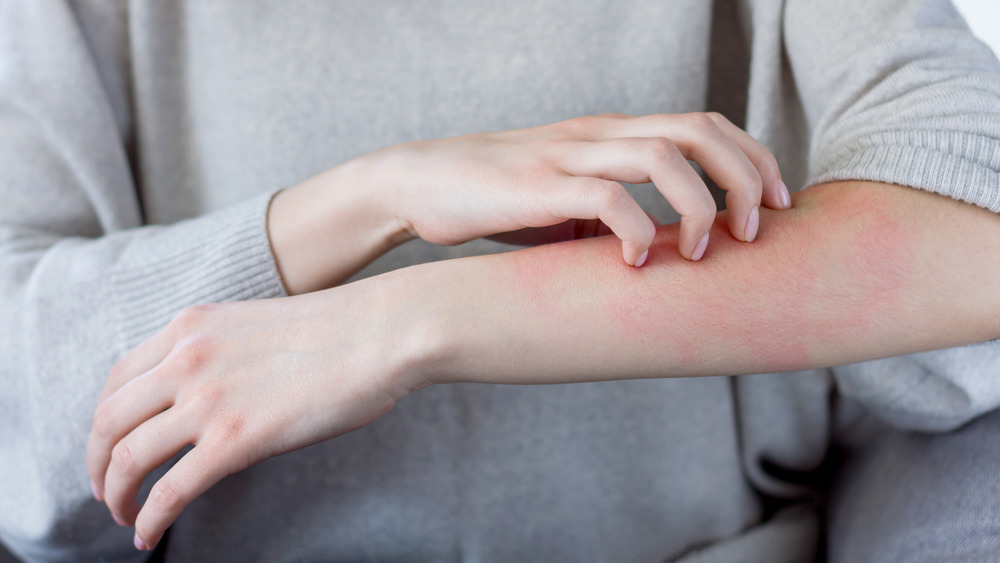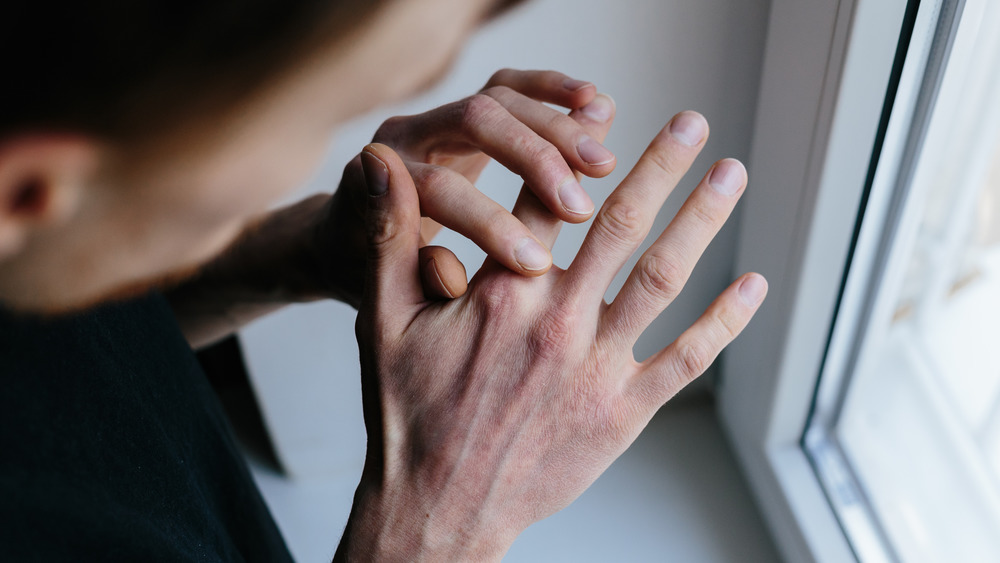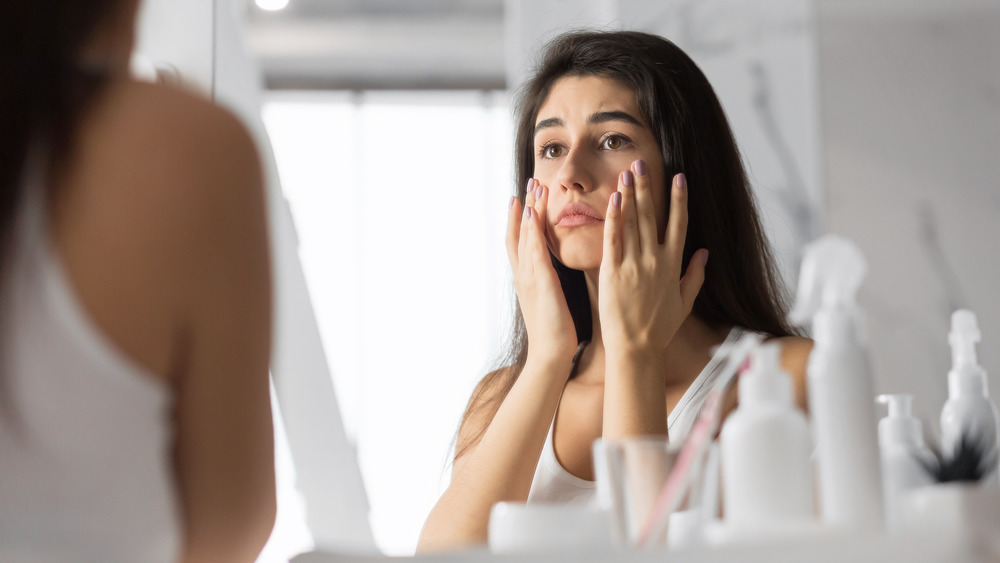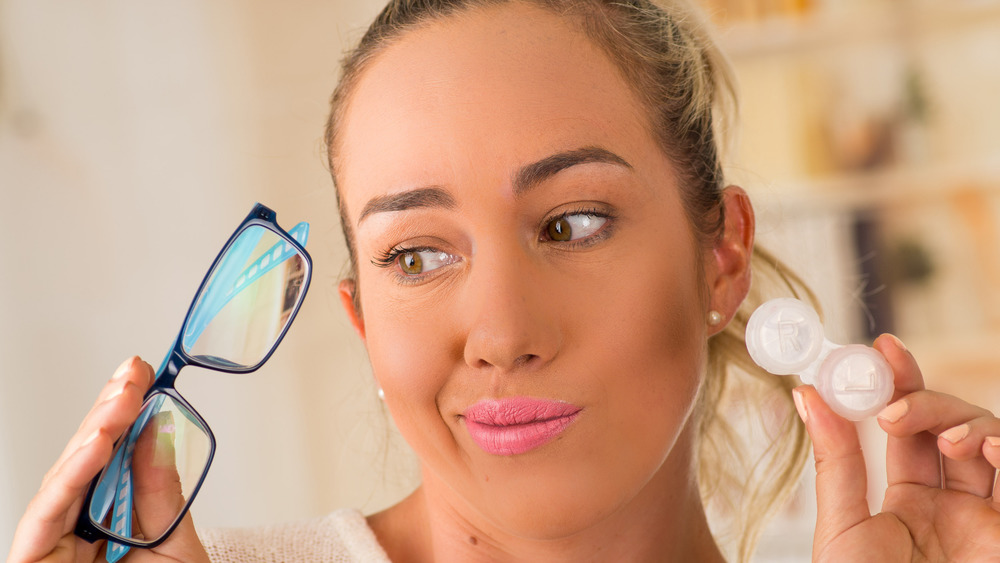You're Spending Too Much Time Inside If This Happens To Your Body
It's only natural to spend more time inside when the weather grows colder and the days grow shorter. With the window for outdoor activities smaller, we miss out on a number of benefits relating to both body and mind. These include increased vitality, better moods, better focus, and even a better immune response. Sure, spending time indoors has the advantage of protecting our skin from damage from the sun and other elements. While sunscreen, hats, and other protective clothing can protect the skin from damage, it's far more difficult to artificially replicate the benefits of being outside.
As mental health counselor Jennifer Henry told Health Digest, humans were not meant to spend the bulk of our time indoors. If you don't believe it, all you would have to do is confine yourself to being indoors for a few days, and you would recognize pretty quickly how your body would react. Of course, that's not advisable because as anyone who has spent time in a lockdown can attest, all that time indoors comes at a price. If any of the following things happen to your body, you should consider whether you've been spending too much time inside.
Insomnia may mean you're spending too much time inside
If you've been having trouble falling asleep or staying asleep (a disorder clinically known as insomnia), it could be a sign that you've been spending too much time inside, physician Leann Poston told Health Digest. The sleep-wake cycle is strongly influenced by environmental cues such as periods of light and darkness, according to Dr. Poston. But your body isn't fooled by artificial light. In fact, a 2013 study published in Current Biology showed that the body absolutely does recognize and respond more efficiently to natural light (from the sun) than to artificial light (such as light from an indoor lamp).
Insomnia can be exacerbated further by using electronic devices in bed or close to bedtime, according to licensed mental health counselor Jennifer Henry. The reason is that computer and phone screens emit a type of blue light that is associated with a decrease in the amount of melatonin produced by the body, and a lack of melatonin has been shown to result in insomnia and other sleep dysfunction.
Fatigue could indicate you're spending too much time inside
Fatigue, which is defined as a persistent and behavior-limiting tiredness, can be a symptom of any number of illnesses and conditions, like insomnia. However, spending too much time indoors can also cause fatigue without insomnia. That's because time spent indoors can contribute to vitamin D deficiency, which, according to the telemed team at EZCare Clinic, counts fatigue as one of the major symptoms.
"Exposure to natural sunlight is important in increasing your body's Vitamin D levels," the telemed team told Health Digest. Thankfully, your skin manufactures vitamin D whenever it is exposed to sunlight, the Skin Cancer Foundation explained. Supplements and vitamin-D-enriched foods can also help your body to manufacture and store vitamin D, but sunlight is important. "Sun exposure is by far the best way to boost vitamin D levels, particularly because very few foods contain significant amounts," Healthline explained.
If you've lost motivation, perhaps you're spending too much time indoors
"Often when we feel depleted we reach for a cup of coffee, but research suggests a better way to get energized is to connect with nature," noted University of Rochester professor Richard Ryan in a press release. Ryan led a seminal study on the effects of time spent outside on feelings of vitality (a lively, energetic quality associated with motivation and resilience).
The professor's study, which was a composite of five related studies, demonstrated that exposure to the outdoors can engender feelings of vitality. And feelings of vitality aren't just good for ourselves; they actually benefit the economy and society, according to a subsequent study published in the European Journal of Public Health in 2015. In other words, it is a scientific fact that possessing vitality serves both you and the greater good, and one way to feel, and remain feeling, this way is to spend time outdoors.
You may feel anxiety creeping in if you're spending too much time inside
When we spend too much time inside, it's a setup for anxiety, mental health counselor Jennifer Henry advised Health Digest. There are multiple reasons for this, including a lack of exposure to sunlight and fresh air and reduced interaction with extended family and friends. In addition, spending time isolating from the rest of the world can contribute to an encroaching sense that your problems are expanding rapidly in relation to the size of your world (also known by some as that feeling of "living in a bubble").
By contrast, spending time outside allows you to be fully present in the real world and all its vastness, and that tends to put things in a much better perspective. In addition, scientists have been studying the effects of being outside in nature on negative "acute emotions," such as stress and hostility, and have consistently found that this practice (dubbed "forest bathing") works as an effective therapy for reducing such emotions.
Depression may signal you're spending too much time inside
Spending too much time indoors and away from natural daylight is associated with a form of depression known as SAD, or Seasonal Affective Disorder, which tends to present during the winter months when the supply of natural light is at its lowest. But a lack of light exposure isn't the only reason that spending too much time indoors can lead to depression, according to the telemed team at EZCare Clinic. Another is social isolation.
Thankfully, a number of studies indicate that such effects can improve simply by spending time outdoors — even alone. Building on existing research demonstrating that walking outside in nature can improve memory and cognition, a team of scientists out of the University of Michigan investigated whether those benefits might be undermined in people with depression considering individuals who are depressed have a tendency to ruminate over negative thoughts (which is a lot easier to accomplish when alone).
The resulting 2012 study published in the Journal of Affective Disorders showed that "interacting with nature" counteracted the tendency to ruminate, leading to the conclusion that being in nature can be used clinically to supplement existing depression treatments.
Weight gain can mean you're spending too much time indoors
The more time we spend indoors, the more likely we are to adopt a sedentary lifestyle, according to the telemed team at EZCare Clinic. But not only does spending too much time indoors fuel the urge to sit around doing nothing, it also may leave you feeling hungrier than usual.
Another cause of weight gain when spending too much time indoors may be simply that you are closer to food, Dr. Leann Poston pointed out to Health Digest. The constant availability of whatever is in the refrigerator or pantry coupled with boredom from spending so much time within the same four walls (so to speak) can lead to snacking as well as eating too much at meals. "Eating out of boredom is a surefire setup for weight gain," according to Dr. Poston. And weight gain comes with a host of complications, not the least of which is cardiovascular disease.
If your back aches, it could be because you're spending too much time indoors
According to Harvard University's health publication, Healthbeat, most back pain develops as a result of day-to-day repetitive activities such as sitting in front of a computer. Those repetitive activities result in muscular tightness, which creates tension that can culminate in back pain. One obvious solution is improving posture. However, prolonged time spent indoors makes improving posture difficult, according to the telemed team at EZCare Clinic.
"When you stay indoors, you spend most of your time either lying down or seated," the experts explained to Heath Digest. "With time, the pressure exerted on your spine, and constant slouching leads to posture problems." The good news, however, is that studies demonstrate that sitting for even just about an hour (66 minutes) less than you normally do each day can reduce upper neck pain and back pain by up to 54 percent.
If you're catching more colds, it could be because you're spending too much time inside
If you've been staying indoors a lot more as of late, you might find it surprising that all that time spent at home can actually compromise your immune system. "Limited sun exposure during the lockdown may worsen vitamin D deficiency or cause a sub-clinical deficiency to become apparent," according to a 2020 study published in Gastroenterology Research." And one of the symptoms of vitamin D deficiency is a compromised immune system. This puts you more at risk for catching colds and viruses.
While it is certainly wise to social distance and avoid going out to crowded places to reduce your chances of getting or spreading COVID-19, that doesn't mean you should avoid stepping out onto your porch or patio or going for a walk. "Spending time outside means more fresh air circulation, space and sunlight," Piedmont Healthcare explained. "These factors make it more difficult for the coronavirus to spread from person to person." Jenay Beshears, the director of infection prevention at Piedmont put it succinctly: "Outside, you've got the air circulating and fresh air blowing."
Your allergies could act up if you're spending too much time inside
If you've got cold symptoms such as a runny nose, a cough, a headache, and watery eyes but don't have a fever or otherwise feel that certain way that only a cold can make you feel, it may be that you're dealing with indoor allergies. These can be exacerbated by spending too much time in your house. As much as we might connect allergies to being outside, the fact is that many allergens are present inside enclosed spaces, according to physician Leann Poston.
Allergens are substances that are otherwise harmless but are capable of triggering an immune response in some people that results in the symptoms of an allergic reaction, usually in the nose, eyes, ears, skin, or the roof of the mouth.
Although the American Academy of Allergy, Asthma, and Immunology points to pollen as one of the most ubiquitous allergens, other common allergens include dust mites, animal dander, and mold. Additionally, exposure to certain viruses and bacteria can lead to allergy symptoms, Dr. Poston told Health Digest.
This rash is a sure sign that you've been spending too much time inside
Your skin can reveal some surprising things about your health. Certain rashes have been linked to certain illnesses (e.g. itchy red bumps and chicken pox) and conditions (e.g. the butterfly rash and lupus). According to dermatologist Hadley King, there's even rash that is associated with spending too much time indoors. It's called polymorphous light eruption, or PMLE.
PMLE causes itchy patches of red bumps or blisters and can appear on any skin that is exposed to the sun after a long period of non-exposure. Yes, stepping outside after a while of being sequestered at home can really cause you to break out in a rash. PMLE affects approximately 10 to 15 percent of the U.S. population and it ordinarily presents in spring and early summer. However, it can also be seen in the colder months.
Dry skin can mean you've been spending too much time inside
There's nothing like cold, dry winter air to chap your lips and even your cheeks. If you're inclined to participate in winter sports such as ice skating and skiing, you likely know this all too well. However, with many people spending significant periods of time inside in 2020, dermatologist Rhonda Klein expects to see dry, chapped skin in patients who haven't been spending any time outside at all.
"Sometimes, the only symptom of dry skin is itching," according to Harvard's Healthbeat, "although most people also will notice that their skin is flaky and slightly more wrinkled than normal." Although dry skin caused by time spent indoors is commonly associated with air conditioning during the summer months, those who spend a great deal of time indoors may be at risk for dry skin because heated air can be quite dry.
To counteract the effects of dry, heated air, Dr. Klein recommends staying hydrated by drinking lots of water and running a humidifier at night. You should also moisturize to prevent your skin from cracking. "Ointments, creams, and lotions (moisturizers) work by trapping existing moisture in your skin," the American Academy of Dermatology Association explained. This is why it's important to moisturize soon after bathing or washing your hands or face.
Your skin may show signs of premature aging if you're spending too much time inside
As society's use of electronic devices has grown over the past several years, so too has the concern among scientists that all that screen exposure is harming our health. Of particular concern is the blue light that comes from such exposure. Although some blue light is necessary for good health as it supports alertness, memory, mood, and cognitive function, according to the Prevent Blindness foundation, there is concern that the blue light from device screens is harmful because of how closely we hold our screens to our eyes and how much time we spend looking directly at them.
One of the ways that blue light from small screens can harm us is by interfering with our natural sleep-wake cycle, according to Harvard's Healthbeat. Another risk associated with blue light exposure is premature skin aging, including the development of dark spots, according to dermatologist Joshua Ziechner. And if you can't get outside and away from your screen? Antioxidants can help protect your skin from damage, Dr. Zeichner said.
If you're starting to have trouble seeing the TV screen, you may be spending too much time inside
Perhaps you've felt some eye strain after spending a lot of time staring at your computer screen. But did you know that spending too much time indoors can actually cause nearsightedness? A 2016 study published in Points De Vue: The International Review of Opthalmic Optics revealed that the amount of time school-aged children in Australia spent indoors versus outdoors predicted whether they would develop nearsightedness over the course of three years or not. Children who spent less time outside were at greater risk for this vision condition.
While more research is needed before scientists can explain why greater time spent indoors is associated with a greater risk of myopia, a strong argument exists for supporting the health of your eyes by making an effort to get outside more. And this may be especially true for your children's eyes.
That disconnected feeling you've been fighting off? It could mean you're spending too much time inside.
One consequence of spending too much time cooped up indoors that isn't talked about nearly enough, according to Time, is the feeling of disconnection that comes from the absence of contact not only with other people but with living things like animals and plants. Dr. Zachary Berk, meditation expert and CEO of online enlightenment app HappCo, told Health Digest that he concurs, pointing out that getting outside and putting yourself in the presence of nature, even in winter, when the trees are devoid of leaves, can bring about a feeling of connectedness with something outside of yourself.
There's something to be said for that feeling of connectedness, according to Dr. Berk. In addition to an all-over feeling of wellness, it can inspire a sense of compassion toward others, which is precisely the opposite of the negative and "acute emotions," including hostility, which scientists have noted tend to diminish as a result of forest bathing.

